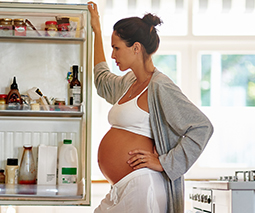Should women be entitled to miscarriage bereavement leave?

For a long time, miscarriage has been viewed and treated as one of those unfortunate things that happen. There’s little time for grieving or consideration of the devastating impact it can have emotionally and mentally. But in New Zealand that might be about to change.
Miscarriage bereavement leave bill
A bill currently being considered by the country’s parliament is proposing that women who have a miscarriage at any stage in their pregnancy should be entitled to three days paid bereavement leave. It would also apply to their partners.
Jane Scotts totally supports this idea. Seven years ago, Scotts experienced a miscarriage at six weeks gestation. While she’s since had two children, the memory of that miscarriage is still raw.
“I started getting severe cramps on the Sunday morning and knew what was happening,” she says. “By the afternoon I’d miscarried, and I was a mess. I didn’t realise until that point just how attached I already was to my baby. I felt numb.”
Read more about pregnancy loss:
- “There is no rulebook for grief”: Carrie Bickmore on her two miscarriages
- The dos and don’ts of supporting women after a miscarriage
- New organisation offers free support to women after early pregnancy loss
Women don’t feel justified in taking time off
Scotts took the next two days off work, calling in sick. She curled up in bed and took the time to process her loss.
On the Wednesday, she returned to work but fell apart when she overheard a colleague discussing her own pregnancy. At that point, she told her boss what had happened.
“I was lucky because he was very understanding and supportive,” she says. “He told me to go home and take as long as I needed, but it still came out of my sick leave allowance. There was no exception for that.”
Scotts believes that a lot of women get up and get on with things because they don’t feel justified in taking time off when they’re not ‘physically’ sick. This approach is also perpetuated by the misconceived view that an early miscarriage ‘wasn’t really a baby yet’.
“It’s devastating regardless”
“I think that offering miscarriage bereavement leave would be a great step forward for employers and employees. I think that it would go some way in opening up conversations around a difficult topic and also acknowledging the severity and subsequent impact that such a loss can have.”
“For a woman, it doesn’t matter how far along she is in her pregnancy when she miscarriages. It’s devastating regardless,” says Scotts. “Once you know that you’re growing a human, you’re mentally preparing for that and emotionally you’re attached.”
Janelle Moran is the fundraising and communications officer at Sands, a support service for miscarriage, stillbirth and newborn death. She echoes Scotts’ sentiments.
“Every pregnancy loss is different but for many parents the loss of an early pregnancy is a shocking life event,” she says. “For some, the grief they may feel in the case of an early miscarriage can be just as severe as it is with late miscarriages, stillbirths or newborn deaths.”
“The loss of a pregnancy is not just physical, it also encompasses the loss of parents’ hopes and dreams for the future.”
Moran notes that there’s no ‘quick fix’ for grief, and feelings of loss and sadness may continue for a long time. She says that Sands would welcome provisions for flexible leave, enabling grieving parents the time for self-care and to seek support if required.

Not everyone will feel comfortable
Despite this, she’s aware of the potential issues associated with such leave. Not everyone will feel comfortable talking to their employer about their miscarriage and employers may be more concerned about their bottom line.
“With current statistics estimating that 1 in 4 known pregnancies end in miscarriage, the demand for this leave would have an economic impact, especially in terms of smaller business and organisations,” says Moran.
But why else may employers be hesitant to offer this leave?
“I think that miscarriage is viewed as common, so the loss is trivialized and employers are hesitant to pay out leave,” says obstetrician and gynaecologist, Talat Uppal.
“Unlike sick leave, where a doctor’s note is required, it’s hard to prove a miscarriage, particularly if it’s early and some employers may be sceptical that there’s the potential for abuse.”
Despite this, Uppal is personally fully supportive of such legislation. If it’s approved in New Zealand, she hopes Australia will follow.
“I think that New Zealand is leading the way with women’s health issues like this and I think it’s important that we’re finally getting recognition,” she says “Miscarriage bereavement leave would support women physically and mentally but, above all else, show respect for women’s health and women in general.”
“There’s long been gender inequality in health and this leave would send the message that we need to be inclusive of women. It would also show women that they don’t need to hide or suffer feelings of guilt or shame. A miscarriage is not their fault.”
If you’re struggling with the loss of a baby, please don’t go it alone. SANDS counsellors are there to support you and provide helpful advice about living with loss.








